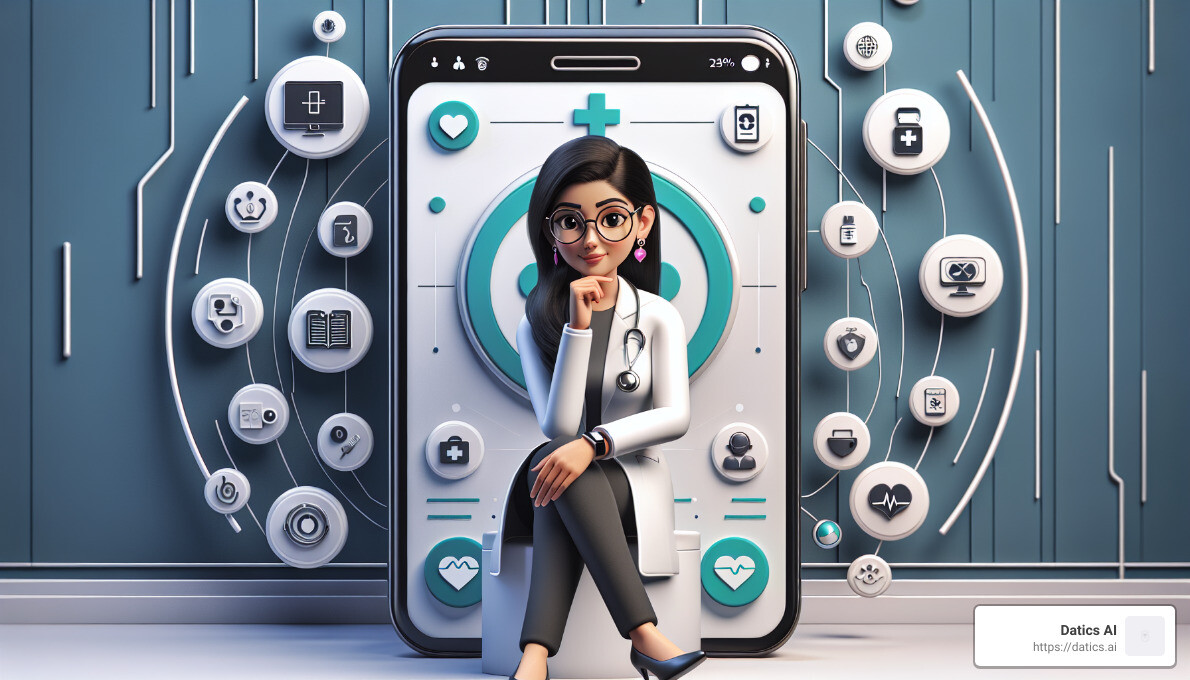Introduction
A custom healthcare software development company specializes in creating tailored software solutions to meet the unique demands of healthcare organizations. These companies focus on developing applications that cater to specific operational needs, enhance patient care, and ensure compliance with healthcare regulations, such as HIPAA. Here’s a quick overview of what you should look for when searching for a custom healthcare software development company:
- User-Friendly Interfaces: Applications should be intuitive and easy to use for both healthcare professionals and patients.
- Data Security: Robust measures like encryption and access control to protect sensitive patient information.
- Regulatory Compliance: Assurance that the software adheres to standards like HIPAA and HL7.
- Interoperability: Seamless integration with existing healthcare systems and workflows.
- Continuous Support & Updates: Ongoing maintenance and enhancements to keep the software compliant and efficient.
As Umair Majeed, CEO of Datics AI, with a robust background in custom healthcare software development, I emphasize a user-centric approach while ensuring regulatory compliance and advanced data security. This commitment makes custom solutions not just reliable, but also innovative and effective.
What is Custom Healthcare Software Development?
Custom healthcare software development involves creating software solutions tailored to meet the specific needs of healthcare organizations. Unlike off-the-shelf software, custom solutions are designed to address unique challenges, streamline workflows, and enhance patient care.
Benefits of Custom Healthcare Software
Tailored Software: Custom healthcare software is built to fit the exact needs of your organization. This means you get a solution that aligns perfectly with your workflows, regulatory requirements, and operational goals.
User Convenience: Custom software emphasizes user convenience by providing intuitive UX/UI design. This ensures that healthcare professionals can navigate the software with minimal training, reducing the learning curve and increasing productivity. As a result, staff can focus more on patient care and less on figuring out how to use the software.
Specific Needs: Every healthcare organization has unique requirements. Custom software can incorporate specific features that off-the-shelf solutions might not offer. Whether it’s integrating with existing electronic health records (EHRs) or adding specialized modules for telemedicine, custom software can be built to meet these needs.
User-Centric Design: A user-centric approach ensures that the software is designed with the end-user in mind. This means creating interfaces that are easy to use and workflows that match the daily operations of healthcare professionals. This approach not only enhances user satisfaction but also improves overall efficiency.
Workflow Optimization: Custom healthcare software can streamline and automate various processes, leading to optimized workflows. For instance, a custom solution can automate appointment scheduling, resource allocation, and patient management, reducing administrative burdens and allowing healthcare providers to focus more on patient care.
Regulatory Compliance: Compliance with healthcare regulations like HIPAA, HHS, and HL7 is crucial. Custom software can be built to ensure that all regulatory requirements are met, safeguarding patient data and reducing the risk of legal issues.
PHI Security: Protecting Personal Health Information (PHI) is a top priority in healthcare. Custom software can incorporate advanced security measures, such as data encryption and secure user authentication, to protect sensitive patient data from breaches and unauthorized access.
Seamless Integration: One of the significant benefits of custom healthcare software is its ability to integrate seamlessly with existing systems. Whether it’s integrating with EHRs, laboratory information systems (LISs), or other healthcare platforms, custom software ensures smooth data flow and interoperability. This eliminates the integration challenges often faced with off-the-shelf solutions.
By focusing on these benefits, custom healthcare software development can significantly enhance the efficiency, security, and effectiveness of healthcare organizations. This leads directly into the next section on the top custom healthcare software development firms.
Key Steps in Custom Healthcare Software Development
Creating custom healthcare software involves several key steps. Each phase ensures the software meets the needs of healthcare providers while remaining compliant and secure.
Planning Phase
In the planning phase, the focus is on concept shaping and requirements analysis. Here’s what happens:
1. Software Idea Translation: Your vision is translated into a solid concept. This involves brainstorming sessions and consultations to define the software’s goals and functionalities.
2. Compliance Roadmap: Ensuring regulatory compliance is crucial. A compliance roadmap is developed to align the software with standards like HIPAA and GDPR.
3. Risk Mitigation: Identifying potential risks early helps in creating strategies to mitigate them. This includes data security risks and operational challenges.
Design Phase
The design phase is all about creating a user-friendly interface and experience:
1. User Journey Mapping: Mapping out the user journey helps in understanding the user’s interaction with the software. This ensures that the final product is intuitive and easy to use.
2. UX Design: The user experience (UX) design focuses on making the software functional and enjoyable. It includes wireframes and prototypes to visualize the end product.
3. UI Design: The user interface (UI) design adds the visual elements. This involves choosing colors, fonts, and layouts that align with the healthcare brand.
Development and Testing Phase
In this phase, the actual software development begins, accompanied by rigorous testing:
1. Iteration Development: The software is developed in iterations, allowing for continuous feedback and improvements. This Agile approach ensures that the final product meets all requirements.
2. Security Features: Security is integrated from the start. Features like encryption and two-factor authentication (2FA) are implemented to protect sensitive data.
3. Comprehensive Testing: Comprehensive testing ensures the software is bug-free and performs well. This includes unit testing, integration testing, and user acceptance testing (UAT).
Pre-launch Activities
Before the software goes live, several crucial activities take place:
1. Documentation Update: All documentation is updated to reflect the latest features and functionalities. This includes user manuals and technical guides.
2. Risk Assessment: A final risk assessment is conducted to identify any remaining issues that need to be addressed before launch.
3. Compliance Audit: A compliance audit ensures that the software meets all regulatory requirements. This is crucial for avoiding legal issues.
4. Premarket Submission: For certain types of medical software, premarket submission to regulatory bodies is necessary to get approval before launch.
Post-launch Support and Maintenance
Once the software is live, ongoing support and maintenance are essential:
1. Daily Administration: Daily tasks such as security checks, updates, and user management are performed to keep the software running smoothly.
2. Performance Monitoring: Continuous monitoring helps in detecting and fixing performance issues promptly. This ensures a seamless user experience.
3. Regular Audits: Regular audits ensure that the software remains compliant with evolving regulations like HIPAA and GDPR.
4. Software Evolution: As new features and requirements emerge, the software evolves. This includes adding new functionalities, customizations, and integrations to keep the software up-to-date.
By following these steps, healthcare organizations can develop custom software that is secure, compliant, and tailored to their needs.
Cost and Timeline of Custom Healthcare Software Development
Sample Costs
When planning to develop custom healthcare software, understanding the costs involved is crucial. The cost can vary greatly based on several factors:
- Software Complexity: A simple digital therapeutics application might start at $100,000, while a multi-functional EHR system can go up to $2,000,000.
- User Numbers: More users mean higher costs due to increased performance and security requirements.
- Integration Requirements: Integrating with existing systems or medical devices can add to the cost.
- Compliance Needs: Ensuring compliance with regulations like HIPAA and GDPR requires additional resources.
- Performance and Security: Advanced security measures, such as end-to-end data encryption and multi-factor authentication, can increase costs.
- Deployment Models: On-premises solutions might be more expensive than cloud-based ones due to infrastructure costs.
- Sourcing Models: In-house development can be costlier than outsourcing.
Here are some sample price ranges for popular healthcare software types:
| Software Type | Cost Range |
|---|---|
| Telemedicine Software | $150,000 to $400,000 |
| Remote Patient Monitoring/Medical Device Software | $200,000 to $400,000 |
| Digital Therapeutics Solution | $100,000 to $500,000 |
| EHR Software | $400,000 to over $2,000,000 |
Development Timelines
The timeline for developing custom healthcare software depends on the project’s complexity and scope. Here’s a general idea of what to expect:
- Project Start: Within 1 week of contract signing.
- MVP Release: From 2 to 4 months. This includes initial planning, design, development, and testing phases.
- New Software Versions: Every 2 to 4 weeks, ensuring continuous improvement and adaptation to new requirements.
Planning Phase: This involves translating your software idea into a competitive solution, analyzing requirements, and creating a compliance roadmap.
Design Phase: Mapping out user journeys and designing an intuitive UX and attractive UI.
Development and Testing Phase: Developing the software in iterations, implementing security features, and conducting comprehensive testing.
Pre-launch Activities: Updating documentation, conducting risk assessments, and compliance audits.
Post-launch Support and Maintenance: Daily administration, performance monitoring, and regular audits to ensure the software evolves with new features and requirements.
By understanding these cost drivers and timelines, you can better plan your custom healthcare software development project, ensuring it meets your budget and schedule expectations.
Frequently Asked Questions about Custom Healthcare Software Development
How much does it cost to develop medical software?
The cost of developing medical software can vary widely. Factors that influence the cost include:
- Software complexity: A simple digital therapeutics app might start at $100,000, while a complex EHR system could exceed $2,000,000.
- Type of software: Web, mobile, or desktop applications have different cost structures.
- Number of users: More users mean more robust infrastructure and higher costs.
- Integration needs: Software that needs to integrate with other systems, like EHRs or medical devices, will be more expensive.
- Regulatory compliance: Ensuring compliance with HIPAA, GDPR, or FDA regulations adds to the cost.
- Performance and security requirements: High performance and strong security features increase development time and cost.
- Deployment model: On-premises solutions can be more expensive than cloud-based ones.
- Sourcing model: In-house development might be costlier than outsourcing.
For example, telemedicine software typically costs between $150,000 to $400,000, while remote patient monitoring solutions range from $200,000 to $400,000.
How to ensure HIPAA compliance in custom healthcare software?
Ensuring HIPAA compliance is crucial for protecting patient data. Here are some steps to achieve this:
- Implement robust security measures: Use encryption protocols, access controls, and multi-factor authentication to protect data.
- Conduct regular audits: Regular HIPAA risk assessments help identify and mitigate potential vulnerabilities.
- Follow best practices: Develop software in line with OWASP recommendations and other industry standards.
- Sign a Business Associate Agreement: This legally binds your custom healthcare software development company to comply with HIPAA guidelines.
- Regular updates: Keep your software updated to address new security threats and compliance requirements.
For instance, companies like ScienceSoft conduct thorough compliance audits and implement advanced security features to ensure full PHI protection.
What are the benefits of outsourcing healthcare software development?
Outsourcing healthcare software development offers several advantages:
- Access to expertise: You get access to a team with specialized skills in healthcare IT and regulatory compliance.
- Cost savings: Outsourcing can be more cost-effective than in-house development, especially for complex projects.
- Faster time-to-market: Experienced teams can accelerate development timelines, ensuring quicker MVP releases.
- Scalability: Outsourced teams can easily scale up or down based on project needs.
- Focus on core activities: Healthcare providers can focus on patient care while the software development company handles the technical aspects.
For example, outsourcing to a company with a strong portfolio and experience in healthcare can ensure that your project is handled efficiently and meets all regulatory requirements.
By addressing these FAQs, you can make informed decisions about your custom healthcare software development project, ensuring it meets your needs and compliance requirements.
Conclusion
At Datics AI, we specialize in custom software development tailored to the unique needs of the healthcare industry. Our end-to-end services ensure that from idea inception to full deployment, your project is handled with the utmost expertise and care.
Why Choose Datics AI?
Global Clients: We have a proven track record of working with clients worldwide, delivering top-notch software solutions that meet diverse healthcare needs. Our global experience allows us to bring innovative perspectives to every project.
Innovative Solutions: Our team is dedicated to bringing cutting-edge technologies to your healthcare software projects. Whether it’s implementing AI for better patient data analysis or integrating telemedicine capabilities, we ensure your software is future-ready.
End-to-End Services: From initial consultation to post-launch support, we cover every aspect of software development. Our comprehensive approach means you can focus on providing excellent patient care while we handle the technical complexities.
Custom Software Development: We understand that off-the-shelf solutions often fall short. Our custom software is designed to fit your specific workflows, ensuring seamless integration and enhanced data security.
Our Commitment
We are committed to delivering high-quality, secure, and compliant software solutions. Our approach is transparent, and we keep you informed at every stage of the project. This ensures that there are no surprises and that your software development journey is smooth and efficient.
Ready to transform your healthcare operations with innovative custom software? Let’s craft a success story together.
For more information on how Datics AI can help you achieve your custom software development goals, visit our Custom App Development Services page.




